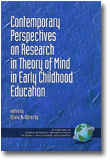
Contemporary Perspectives on Research in Theory of Mind in Early Childhood Education
Edited by:
Olivia Saracho, University of Maryland
A volume in the series: Contemporary Perspectives in Early Childhood Education. Editor(s): Olivia Saracho, University of Maryland.
Published 2014
Over the last 35 years, studies focusing in young children’s knowledge about the mental world have developed into an important area. This body of social knowledge is called theory of mind, which refers to the individuals’ ability to interpret and anticipate the other individuals’ thinking, feeling, and behavior based on their interpretation of the situation. Many researchers and theorists believe that a representational theory of mind offers a basis for various critical facets of social-cognitive performance, such as teaching and learning, lying and pretending, making and keeping friends, and social learning more generally. The purpose of this volume is to share a collection of research strands on theory of mind research. It describes its historical roots and suggests improved alternatives. The focus of the volume is to provide a review and critical analysis of the literature on a contemporary domain of knowledge on young children’s Theory of Mind.
For several decades scholarly research on theory of mind has been flourishing and a collection of new publication outlets have emerged such as the ones reviewed in the volume, which offers a thorough critical analysis of the research in contemporary perspectives on research in theory of mind in early childhood education. The researchers who conducted the critical analyses of the reseearch focused on understanding the mind in relation to (1) young children, (2) several assessment procedures, (3) metacognitive and neuroscientific processes, (3) emotion and educational representations, (4) interaction of social and cultural elements, and (5) inferences and future research directions. The work of these scholars can help guide those researchers who are interested in pursuing studies in early childhood theory of mind in a specific area of study.
CONTENTS
Part I: Introduction: Understanding of Mind. Research on Children’s Theory of Mind, Olivia N. Saracho. Part II: Understanding of Mind in Early Childhood. Theory of Mind: Theoretical Foundations, Olivia N. Saracho. When and How Does a Theory of Mind Arise? Ted Ruffman and Mele Taumoepeau. What Young Children Know About Getting a Better Idea: Devil in the Details, Karen Bartsch, Tess N. Young, and David Estes. Part III: Understanding of Mind and Assessment Issues. Assessment of Theory of Mind During Early Childhood and Its Educational Implications, Manuel Sánchez de Miguel, Nuria Galende and Enrique B. Arranz Freijo. Measurement of Theory of Mind in Early Childhood and Implications for Education, Janette Pelletier, Nathalie Rothschild, and Kadria Simons Ghafari. Theory of Mind and False-Belief Understanding, Leon C. De Bruin. Understanding of False Beliefs, Photos, and Signs: What We Learn From Typical Development, Autism, and the Brain, Lai-Sang Iao. Part IV: Understanding of Mind in Metacognitive and Neuroscientific Processes. Neuroscience Contributions to Childhood Theory of Mind Development, Lindsay C. Bowman and Henry M. Wellman. A Review of Young Children’s Metacognitive Ability of Introspection, Eleonora Papaleontiou-Louca and Niki Thoma. Part V: Understanding of Mind, Emotion, and Educational Representations of Relationships. Theory of Mind and Academic Competence During Early Childhood: Emotion Understanding, Relationships, and Learning from Others, Kristin Hansen Lagattuta, Karen Hjortsvang, and Katie Kennedy. Theory of Learning, Theory of Teaching, and Theory of Mind: How Social-Cognitive Development Influences Children’s Understanding of Learning and Teaching, John Knutsen, Douglas Frye, and David M. Sobel. Theory of Mind (ToM) in Early Education: Developmental Progression of Early Theory of Mind Skills, Social Developmental Factors and the Importance of ToM for Learning, Susanne Kristen and Beate Sodian. Theory of Mind, Tutoring, and Children Teaching, Leïla Bensalah and Nicolas Stefaniak. Part VI: Understanding of Mind and Interaction of Social and Cultural Elements. Culture and the Development of Theory of Mind, Malin Källberg-Shroff and Joan G. Miller. Family Context and Theory of Mind Development in Early Childhood, Nuria Galende, Manuel Sánchez de Miguel, and Enrique B. Arranz Freijo. From Theory of Mind to Theory of Relation: Sociocultural Perspectives on Japanese Children’s Social Understanding, Mika Naito. Part VII: Conclusion. Theory of Mind: Inferences and Future Research Directions, Olivia N. Saracho. About the Contributors.
-
Paperback9781623965112
Web price: $62.04 (Reg. 72.99)
-
Hardcover9781623965129
Web price: $89.24 (Reg. 104.99)
- eBook9781623965136

- EDU023000 - EDUCATION: Preschool & Kindergarten
- EDU037000 - EDUCATION: Research
- EDU010000 - EDUCATION: Elementary
-
 Contemporary Perspectives on Research in Assessment and Evaluation in Early Childhood Education
Contemporary Perspectives on Research in Assessment and Evaluation in Early Childhood Education
-
 Contemporary Perspectives on Research in Motivation in Early Childhood Education
Contemporary Perspectives on Research in Motivation in Early Childhood Education
-
 Contemporary Perspectives on Research on Bullying and Victimization in Early Childhood Education
Contemporary Perspectives on Research on Bullying and Victimization in Early Childhood Education
-
 Contemporary Perspectives on Research on Child Care in Early Childhood Education
Contemporary Perspectives on Research on Child Care in Early Childhood Education
-
 Contemporary Perspectives on Research on Child Development Laboratory Schools in Early Childhood Education
Contemporary Perspectives on Research on Child Development Laboratory Schools in Early Childhood Education
-
 Contemporary Perspectives on Research on Coronavirus Disease 2019 (COVID-19) in Early Childhood Education
Contemporary Perspectives on Research on Coronavirus Disease 2019 (COVID-19) in Early Childhood Education
-
 Contemporary Perspectives on Research on Immigration in Early Childhood Education
Contemporary Perspectives on Research on Immigration in Early Childhood Education

